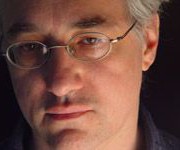2007 – Sebastian Currier
“Static,” a chamber music work by American composer Sebastian Currier, has earned the 2007 University of Louisville Grawemeyer Award for Music Composition.
The name of the six-movement piece for flute, clarinet, violin, cello and piano reflects “different meanings of the word ‘static,’ which can be a state of quiet balance or the erratic noise between radio stations,” said Marc Satterwhite, a UofL music professor who directs the music award.
“This emotionally complex work explores a huge range of instrumental color within a fairly small ensemble,” Satterwhite said.
Currier, who teaches at Columbia University, studied at the Manhattan and Julliard schools of music. His winning work was commissioned by Copland House of Cortlandt Manor, N.Y., for its resident ensemble, Music from Copland House, with funds from Meet the Composer, a national organization supporting new works by composers.
The ensemble premiered the piece at Columbia’s Miller Theatre in February 2005 and recorded it for Koch International Classics.
The work, named winner of the 21st Grawemeyer music prize at a UofL Symphony Orchestra and Wind Symphony concert today in Carnegie Hall, was selected from among 153 nominations worldwide.
About Sebastian Currier
Sebastian Currier’s music has been called “music with a distinctive voice” by the New York Times and “lyrical, colorful, firmly rooted in tradition but absolutely new” by the Washington Post.
A faculty member at Columbia University, Currier lives in Manhattan. He taught at Julliard School of Music from 1992 to 1998 and holds a doctorate in musical arts from Julliard, where he studied with American composer Milton Babbitt.
Currier grew up in a musical family. His mother, Marylin, and his brother, Nathan, are also composers. His father, Robert, was a violist and string teacher.
In 2005, the Berlin Philharmonic presented a full evening of Currier’s chamber music. Last year, he returned to Berlin for the premiere of his work “Broken Minuets,” performed by harpist Marie-Pierre Langlamet and the Oriol Ensemble.
His “Microsymph,” described as a large-scale symphony squeezed into only 10 minutes, was commissioned by the American Composer Orchestra and premiered at Carnegie Hall in New York. The piece, recorded by Frankfurt Radio Orchestra, has been performed by the San Francisco Symphony, Gewandhaus Orchestra, Eos Orchestra and National Symphony Orchestra.
“Aftersong,” a piece he wrote for violinist Anne-Sophie Mutter, has been performed at Carnegie Hall, Symphony Hall in Boston, the Barbican in London and Grosses Festspielhaus in Salzburg.
Currier also has written works using electronic media and video, including “Nightmaze,” a multimedia piece filled with images of strange road signs that loom up along a dark highway. A compact disc of his string quartets recorded by the Cassatt Quartet causes listeners to “think about music itself,” said a New York Times critic.
Among his other compositions are “Verge,” “Crossfade,” “Scarlatti Cadences and Brainstorm,” “Remix,” “Quiet Time” and “Night Mass.”
Currier has received several prestigious music awards, including the Berlin Prize, Rome Prize and an academy award from the American Academy of Arts and Letters. He has held fellowships with Guggenheim and National Endowment for the Arts and residencies with two of the nation’s foremost artist colonies, McDowell and Yaddo.
His works are published by Carl Fischer in New York.
A sample of “Static” is available at Currier’s official website, sebastiancurrier.com.



